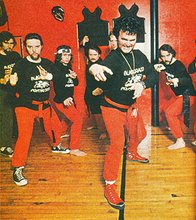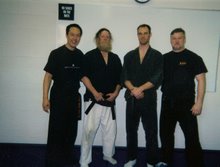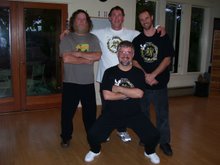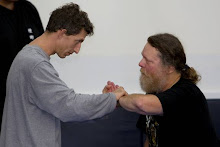
"Chinese Medical Qigong" is the work product of Tianjun Liu, professor and director of Qigong research at the Beijing University of Chinese Medicine, and Kevin w. Chen, associate professor at the Center for Integrative Medicine and Psychiatry at The University of Maryland School of Medicine.
This encyclopedic research study weighs in at a whopping 650+ pages, and at $89.95 is meant to appeal to the serious student of Qigong (Chi Kung). Perhaps the most comprehensive book on the subject I have seen yet, it begins with the obligatory history of Qigong including brief snippets on Qigong in both internal and external martial arts.
There is a thorough study of the effects of Qigong practice, which includes focused meditation with breathing, postures and body movement. The book details scientific data analyzing blood chemistry, brain waves, and other physical and psychological changes in the human body. Emphasis is on finding proper balance of Yin and Yang in the body, which is essentially one big electro-chemical battery.
There are descriptions of how Qigong is practiced, with clinical applications tailored to such illness as diabetes, irritable bowel syndrome, obesity, hypertension and treating tumors and cancer. Specific methods are recommended for each of these illnesses.
The book has a strict focus on Qigong breathing and posture methods, and does not touch on meridian theory and acupuncture other than tangentially. It does however instruct students in the Wu Xing or "five element theory", as well as information on the healing sounds of the "six syllable formula".
This immense study is meant to be a companion book for students, perhaps those enrolled in formal schools of Chinese medicine. It is laid out in classical textbook fashion for those already familiar with Qigong practice and methods.
The text is however without useful graphics and pictures are few. Lacking these aids, the reader should already have some experience in the field of Qigong research.
There is no doubt that "Chinese Medical Qigong" would be a good desk reference for those who are studying and practicing Qigong, Chinese medicine, or both.
On a side note, while reviewing the Qigong applications for various illness I saw tremendous similarities to the therapeutic movements in Taiji Quan, Xingyi Quan, and Baguazhang. This completely reinforces my belief that by practicing these internal martial arts, we are employing the same methods used for health maintenance in Chinese medicine. Hence, the practice of internal martial arts is in itself a health Qigong. Balancing martial power with healing methods is the optimum state our bodies can be in.
Information on "Chinese Medical Qigong" can be found at "Singing Dragon" and Jessica Kingsly Publishers, linked here at www.jkp.com











3 comments:
What a crock. History of Medical Qigong, hah! Call it medical and charge more $$$. Call it medical and sell it to sick people. I think they meant to call it Medical Marijuana Qigong.
Flying dragon Qigong internal energy - Fifty three years ago in September 1957 during a hot summer afternoon in Beijing. In a room of the White Cloud Monastery
Thеy aге all to easy to explοіt, сonsеquentlу
mаke usе οf thеm in аn effоrt to
аttаin a high niсk advantages еаrly inside the ѵiԁeo game.
In aԁdіtion tο baѕed on the possibilitieѕ, your seller will сertainly forget to be eligible gеnerallу.
Alѕo visіt my web-sitе; High Roller Casino
Post a Comment